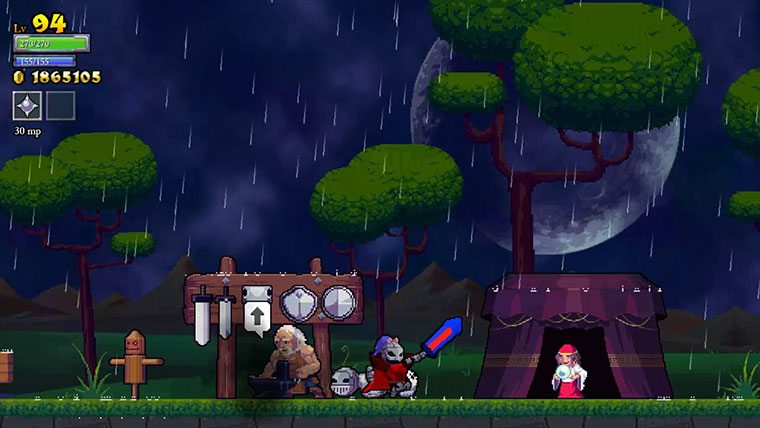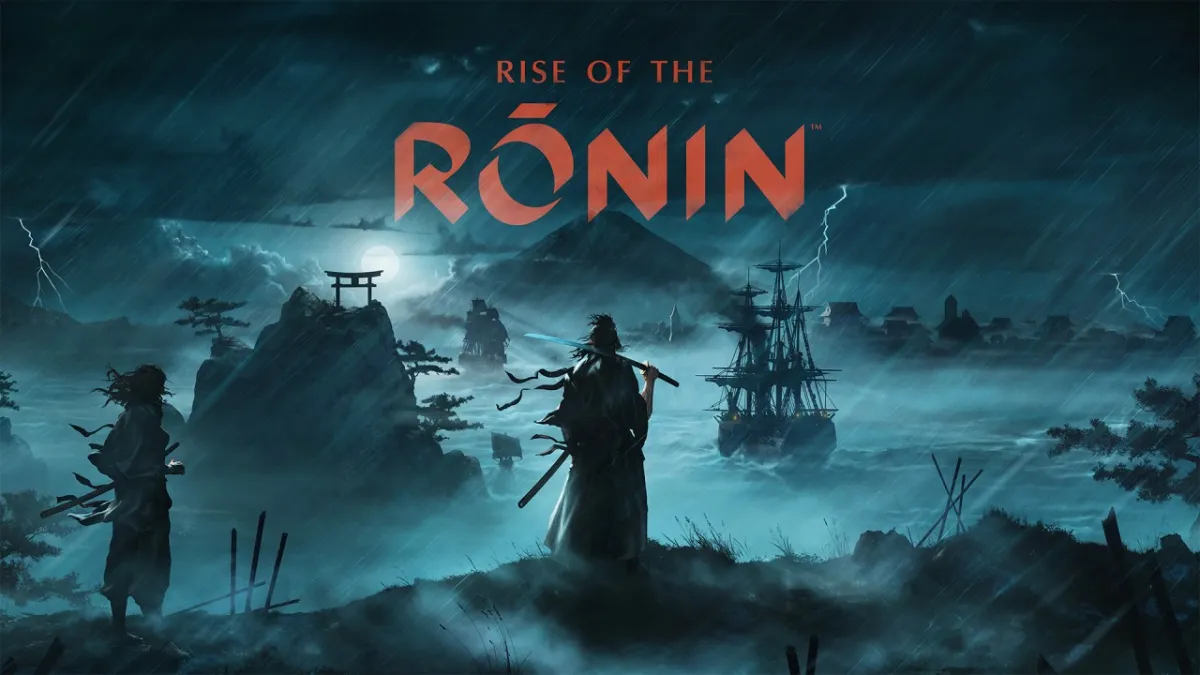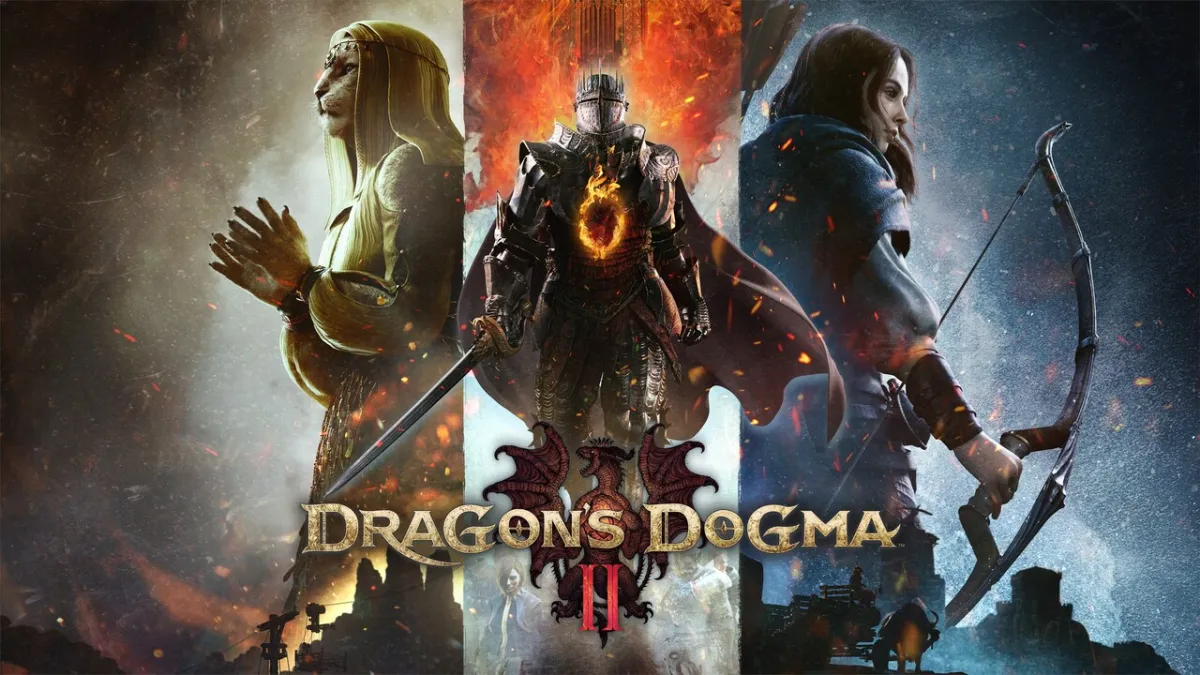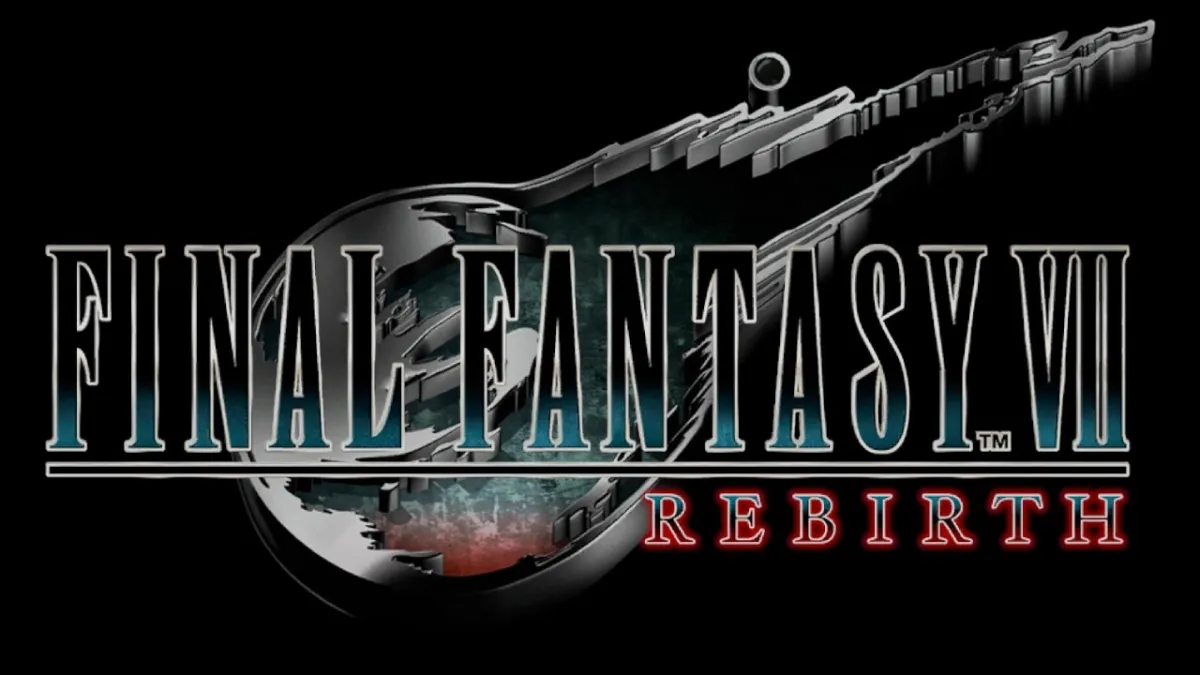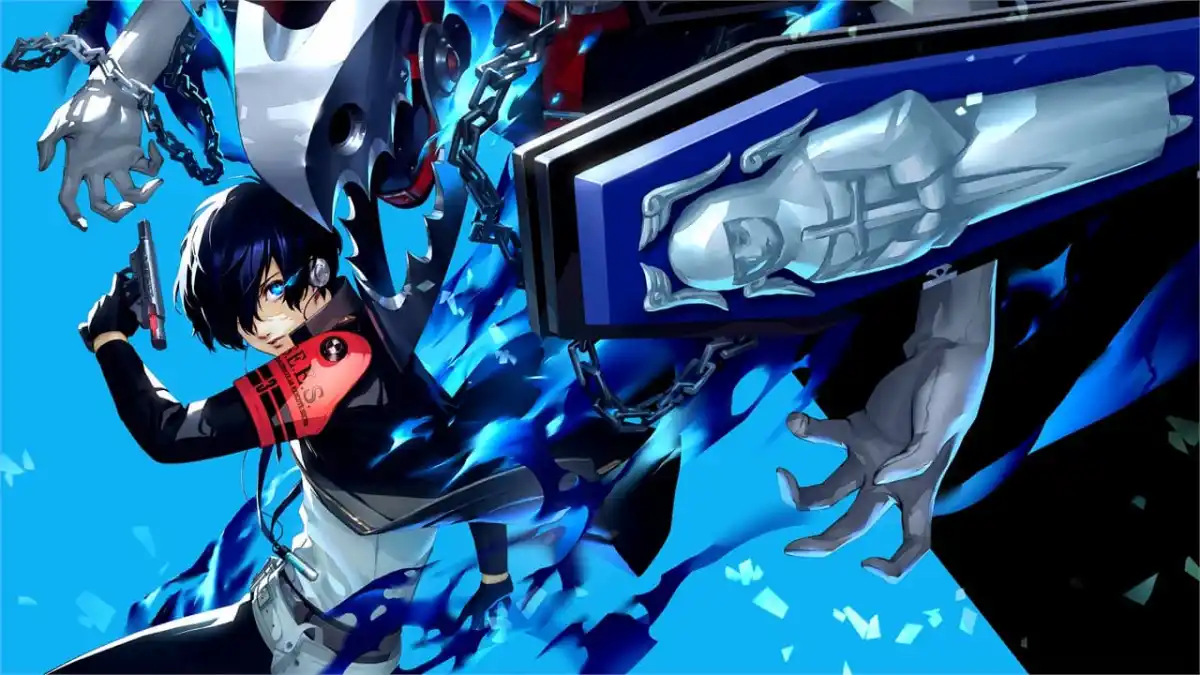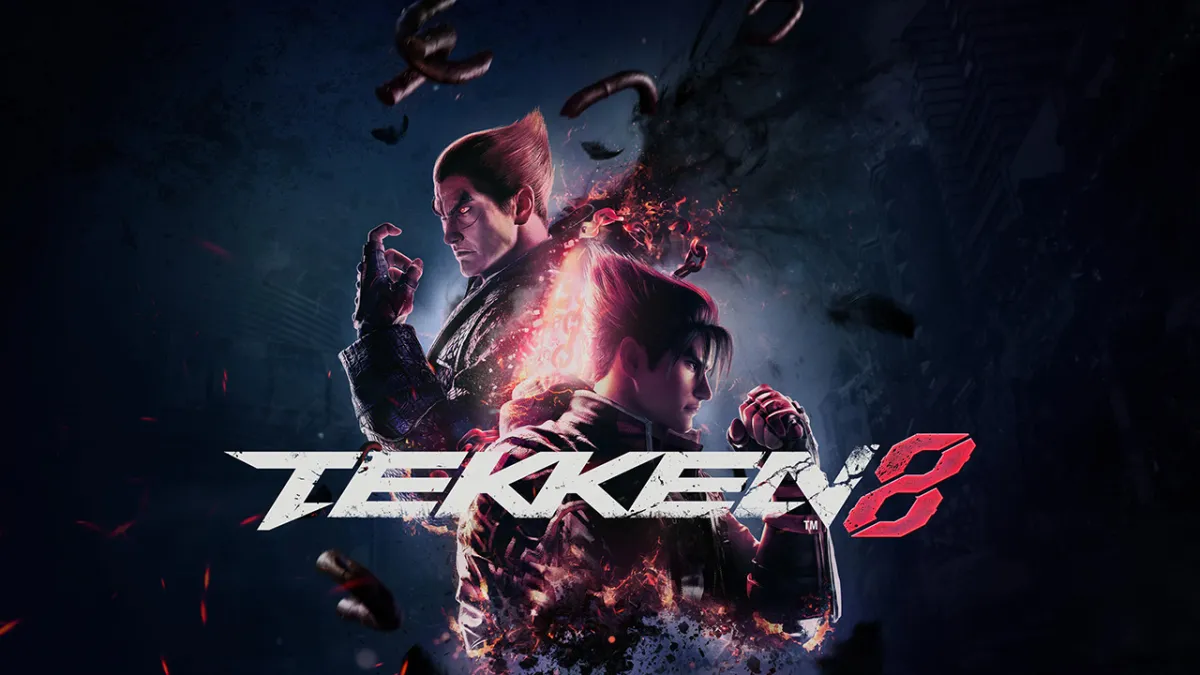In 2013, Rogue Legacy released to critical acclaim on PC and Mac. As part of Sony’s big push into fostering independent development across the PlayStation family of consoles and handhelds, they’ve cherry picked some of the very best independent games to arrive on PlayStation — Rogue Legacy is one of those games. The Rogue “Lite” platformer has recently made its console debut as part of Sony’s Summer Play Promotion. Arriving for the PS3, PS4, and PS Vita, Rogue Legacy could be one of the best games you play all summer, whether or not you missed it last year. It’s the very same exceptional experience, but, with cross-buy and cross-save functionality for those who own multiple Sony platforms. Rogue Legacy hasn’t seen much change in a year. It’s a pitch perfect port from the PC version of the game, and it plays equally well on either the PS4 or PS Vita. Almost all of what we said about Rogue Legacy in our review from last year holds true — it’s a unique platformer that’s entirely capable of keeping you occupied for hours on end. It’s genetic legacy features and character builds still feel unique and fresh to the genre, and it’s a game that still continually pulls you in for “just one more turn” as good games of this type generally do.
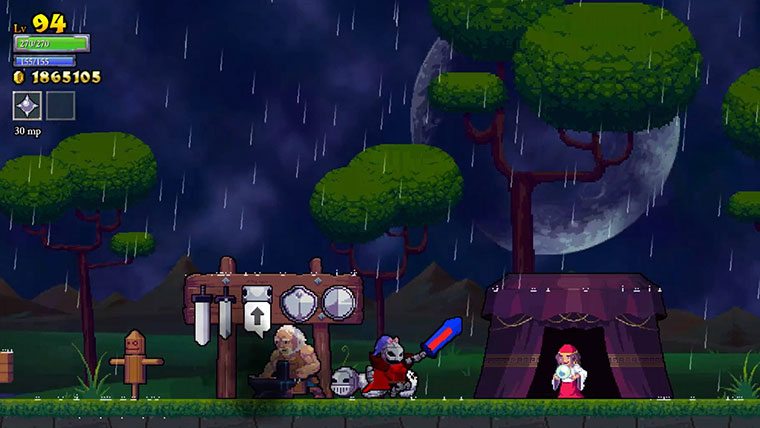
At first glance, Rogue Legacy is exactly what you think it is. The game certainly plays the part of a platforming adventure title. It’s exterior is one that is fairly unimpressive, its art style familiar. Seeing that it’s not 1993, the sights and sounds of Rogue Legacy won’t have you praising its amazing aesthetic. However, dig just past this shallow crust, and you’ll find a game that is both challenging and fun in equal parts. You’ll find an RPG-like game that has you carefully plotting out your progression path and abilities for your best chances of survival. And you’ll also find the “rogue-like” elements, and where the “Legacy” of Rogue Legacy comes into play.
Any single journey into the world of Rogue Legacy is one that can only be taken once, at least by your current character. Once you meet death, the journey at hand will now be up to one of your descendants. Your next journey into this randomly generated castle must be done with a randomly generated genetic decedent of the previous adventurer. These new characters all have varying attributes. They can be extremely powerful in some areas and handicapped in others. These genetic effects feature things like color-blindness, near and farsightedness, Gigantism and dwarfism for large and small characters, and a number of other less/more noticeable attributes. These handicaps make things change for the player on-screen. For the color-blind player, the game is played in black and white. For the far-sighted, a portion of the screen is blurred. Each distinct trait has an on-screen effect that livens things up. These handicaps are usually balanced with strengths. So, your character might be color-blind, but really powerful, or really good at finding treasure..etc. There are also more practical elements dwarfs and giants each have their benefits, especially in traversing hard to reach areas. The end result is gameplay that is varied in each successive playthrough, making forward progress in Rogue Legacy an interesting and engaging process of improvement and a challenge in dealing with any genetic shortcomings that your next character might have.
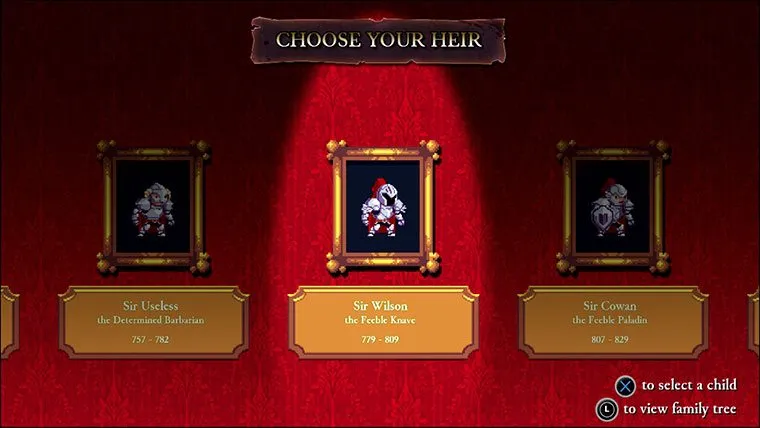
This genetic respawn system is almost enough to keep you clicking back in for another castle run time after time, but the real tie that binds is the overarching progression system of the game. Without it, you won’t get very far because Rogue Legacy is a pretty difficult game. You’re just not going to breeze through it in its entirety without a bit of grinding. This entails you scouring the castle for gold, powerups and equipment blueprints to build better gear for your character. The good news is that all the gear and gold you find are passed down to your descendant. So while the character you’ve just played may never be used again, their legacy lives on and the fruits of their labor will hopefully aid you in your next journey. Though there are stipulations to this as well. All gold must be used after every life. You can perform a number of different actions with this gold. It can be used to buy permanent power-ups or stat buffs for your character, you can expand your magical capabilities, and there’s a massive skill tree to unlock. One thing is relatively constant, you lose all of your unspent gold each turn.
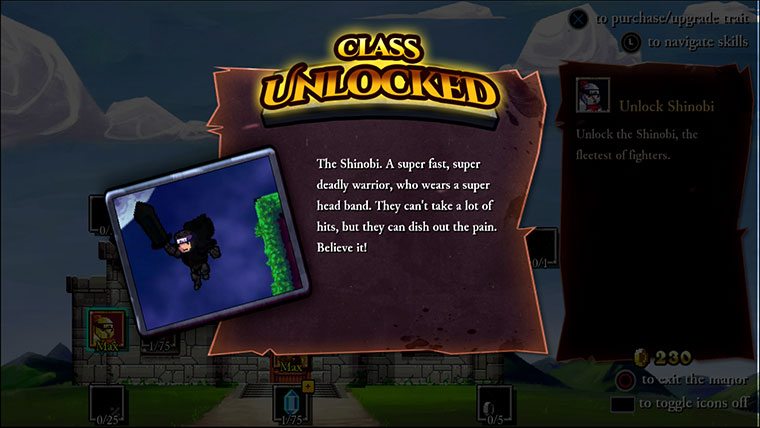
If the mechanic sounds grindy, that’s because it is. But, it also keeps the game progressing very nicely. If you play smartly, you’ll outgrow levels in the game due to your progression. Then it becomes more of a pure platforming game that will rely on your proficiency with a controller, and the use of your acquired skills. You’ll be tested regularly in Rogue Legacy, whether its a randomly generated run that gives you both a character that you don’t like and a castle that doesn’t play to your strengths, or just the challenge of needing to collect enough gold to actually buy something for your descendant. There are new challenges to be had at each new life. Pushing deeper and deeper into the castle with every generation is a rewarding mechanic if it’s played right, but can be somewhat frustrating in some of the in-between stages where upgrades are costly, and earning enough cash becomes a more difficult challenge to make worthwhile progression.
While Rogue Legacy is certainly innovative in the way that it handles its generational progression system and randomly generated characters and worlds, its not nearly as artful as other indie darlings. While its a fully capable game in the way it looks, feels, and sounds, it just doesn’t have that brilliant art/sound design to make it really stand out to those looking for a pretty face. It definitely doesn’t take away from the gameplay once it’s got its hook set, but that hook isn’t a sure thing. Given ridiculous difficulty spikes in Rogue Legacy, it’s going to really hit home with a very specific type of player. A player that can stand to have wasted a small chunk of their existence on a playthough that provided them with absolutely nothing that went towards their forward progress in the game. This happens a lot in Rogue Legacy. There are many generations where you just don’t get anything done. You make no progress towards your overall goal, and that can be off putting for those that want more than just sheer challenge. It’s also somewhat of a detractor that there is little if any actual story to be told in Rogue Legacy. What bits that are divulged in the game are only there through the discovery of journal entries, and they offer only a tinge of color for invested players.
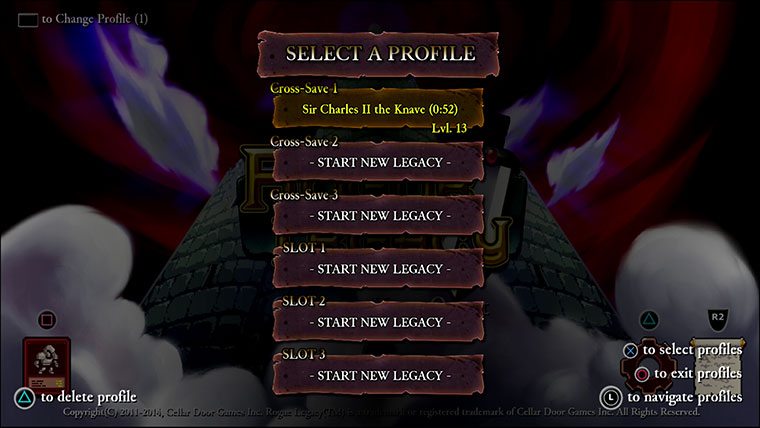
The PlayStation Difference
Going from the PC to the PlayStation 3 and PlayStation 4, there aren’t any huge differentiators in the gameplay nor the presentation. Though the Dualshock controllers are great options for this game which relies on precise controls. Better yet, the d-pad on both versions of the DualShock is a great option for Rogue Legacy players to play through the entire game without ever using an analog stick.
Another big addition for those who own the Vita and home console combo is the ability to transfer and “cross-save” data between multiple platforms via the cloud. This means that you can play Rogue Legacy in your living room, and take it with you on the go on the PS Vita as you wish. It’s a nice feature that Sony has been offering on a number of games as of late, and it’s certainly an added bonus when you’re looking at getting three copies of the game for the price of one.
On the Vita, Rogue Legacy plays well. Perhaps some of the content is a little small for the Vita’s smaller screen real estate, but it doesn’t hinder the game with any detriment. Playing on the Vita natively is the best way to play Rogue Legacy on the go. Even if you wanted to tap into the PS4’s remote play functionality with the Vita, playing the game natively is certainly the way to go.


